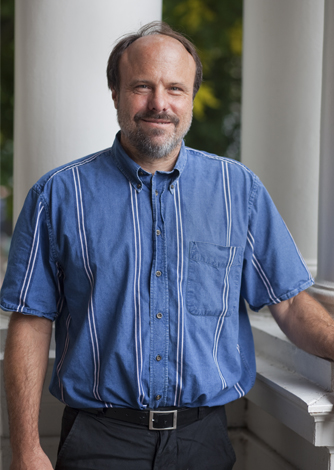
Kennon Sheldon, professor of psychological sciences, has been studying happiness and well-being since he was a graduate student.
Publications file photo
Happiness is of major interest to Kennon Sheldon, MU professor of psychological sciences.
Even before he started teaching at MU in 1997, the core topic of his research was the measurement of well-being and happiness.
His interest started when he was a graduate student at the University of California–Davis. He continued the work for five years as a postdoctoral researcher and then as a visiting assistant professor at the University of Rochester.
“My mentor [from graduate school], who studied what kinds of goals people pursue, was interested in well-being, as well,” Sheldon said. “Then I started looking at things like the materialistic goals versus prosocial goals and how does that affect your well-being.”
His most recent research was with Yuna Ferguson, a former MU doctoral student in psychological science who now is an assistant professor at Pennsylvania State University–Shenango. Sheldon and Ferguson co-wrote the study “Trying to Be Happier Really Can Work,” which appeared in The Journal of Positive Psychology. He said that Ferguson’s dissertation related to his own core interest in the measurement of happiness.
“So there’s this question about if you do something in order to make yourself happier, will it backfire?” Sheldon said. “Yuna Ferguson decided to explore this question. What happens if you’re trying to use an experience to get happy versus not?”
The main component of their study was music. Researchers tested whether happy and upbeat music can help increase participants’ happiness level.
Participants were divided into two groups. One group of people were asked to self-observe whether the music boosts their mood over a two-week period. Another group was asked to hear the music but don’t intentionally allow it to affect their mental state. In the second part of the study, Sheldon and Ferguson played Stravinsky to one group and Aaron Copland, a 20th-century composer of upbeat music, to another group.
Researchers found that participants’ positive mood increased only when they tried to use upbeat music to be happier. Participants who listened to happy music but didn’t attempt to use it to affect their mood didn’t become happier, Sheldon said.
“Maybe that’s why people are walking around with iPods and iPhones, listening to their favorite playlist,” he said. “It’s a pick-me-up, and that’s a good thing.”
Another study also involved music. In this study, researchers asked participants to listen to whatever music they like over four weeks, and compared participants’ mood levels at the beginning to the end.
The same conditions were used: One group was asked to attempt to use music to affect feelings, and another group was asked to just enjoy the music without giving much thought to it. Results were similar to those from the upbeat music study. Participants who were asked to self-observe their mood while listening to their favorite music became happier.
Sheldon said that these results might have been a placebo effect. But the tests were solid, so the results are convincing and an interesting matter to study further, Sheldon said.
“Research suggests that we can intentionally seek to make mental changes leading to new positive experiences of life,” Sheldon said. “The fact that we’re aware we’re doing this has no detrimental effect.”
To make himself happier, Sheldon enjoys hiking, taking photographs and going on family trips. He explains that happiness really is based on pleasant experiences.
“I want to help people to fulfill the American Dream,” Sheldon said. “The American Dream can either be about getting rich and famous, or about fulfilling yourself and your potentials. And it’s the second one that I’m interested in.”
— JeongAn Choi